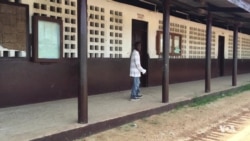When the rate of Ebola infections in Liberia reached zero, the government decided to reopen its borders to its West African neighbors still fighting the disease.
Liberia has managed to get its outbreak under control. But many residents, especially those in northern Lofa County, which was devastated by Ebola, are concerned the deadly virus might make a comeback through visitors from neighboring Sierra Leone and Guinea, which are not yet Ebola free.
In the northern Liberia town of Foya, Fiyah Saah sits under a palaver hut and prepares his breakfast.
“We’re actually coping on fine because we’ve gone for more like hundred-plus days, we have not heard of any new Ebola case in Foya, in Lofa County at large," Saah said.
Residents returning
He said he is happy that the crisis is almost over. People who had fled when Ebola killed more than 40 in the district are returning. And when the nearby Sierra Leone and Guinea borders were reopened, many residents resumed their daily business as cross-border traders.
However, Saah said he and other residents fear the Ebola virus might be carried across the border and doubt the government’s surveillance measures at the borders.
“So the border has been opened. Personally, we’re very much skeptical because if you went at the borders with Guinea and Sierra Leone, we’ve not actually seen some of the protocols, some of the Ebola preventive measures been put into place," he added.
In Monrovia, Tolbert Nyenswah, the country's deputy health minister and Ebola response director, in trying to quell residents' fears, said his team will do everything to keep the country safe.
Nyenswah said he thinks the surveillance system in place is good. While risks remain, he said, his team is monitoring the situation closely and will quickly move in should a new case be recorded.
“We have not stopped meeting. Our incident management team is still [intact]. We’re still having our regular operational meeting, looking at the situation on every single day, 24/7," Nyenswah said.
He said Liberia’s health facilities have improved infection prevention controls.
Protocols in place
In Monrovia and Montserrado County, which were the Ebola epicenter of West Africa for weeks, the government still works with about 4,000 case-finders who check households on a daily basis. At the borders, health workers try to raise awareness and establish a system where citizens immediately report back to them or their community leaders in case anyone shows symptoms of Ebola.
Nyenswah said the new strategy is to follow up with people crossing the border and to actively engage people who are entering Liberia.
"In case there is an event reported, we can jump on it. So event-based and active case-finding are complementary to keep Liberians and Liberia safe of Ebola," he said.
The World Health Organization reported last week that more than 10,000 people have died of Ebola in the current outbreak in West Africa, with 4,000 of those deaths occurring in Liberia.
Nyenswah said even if Liberia is officially Ebola free, his team will remain on the watch until the situation in the neighboring countries is also solved.





